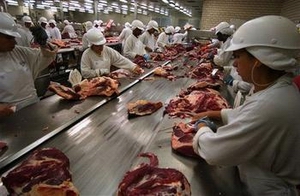 S SA (JBSS3), the world’s biggest beef producer, is counting on steak-hungry consumers in Japan and other Asian nations to help propel total exports past $10 billion for the first time this year.
S SA (JBSS3), the world’s biggest beef producer, is counting on steak-hungry consumers in Japan and other Asian nations to help propel total exports past $10 billion for the first time this year.“I’m very optimistic about Japan,” Chief Executive Officer Wesley Batista, 43, said about the nation that is the world’s third-largest beef importer. “We’re increasing export volumes and the variety of products we ship,” he said in an interview at the company’s headquarters in Sao Paulo.
Enlarge image Steak-Loving Japan Seen Propelling JBS Profits
Yudai Hanno, head chef at Omotesando Ukai-tei teppan-yaki restaurant, serves steak at the restaurant in the Omotesando district of Tokyo, Japan.
JBS, whose sales to Asia jumped 30 percent in the first quarter from a year earlier, is boosting shipments after Japan eased import curbs and China became its biggest market. Soaring demand from Asia, the destination for about a third of JBS’s beef, pork and poultry exports, may help cut debt after Batista’s brother, former CEO Joesley Batista, embarked on a $2.3 billion acquisition spree that turned the family business into a $10 billion company.
The meat provider’s 17 percent return in the past month makes it the best performer among the world’s five biggest meatpackers by market value, data compiled by Bloomberg show. It’s trading at about 11 times its estimated 2013 earnings, compared with a ratio of 24 for BRF SA, Brazil’s biggest food-processing company, and 19 for Marfrig Alimentos SA, the second largest.
Plant Ramp-Up
The company, which produces about 13 percent of the world’s beef, took over four slaughterhouses in Brazil this year, along with two in the U.S. and a pair in Canada. This will help boost profit as JBS steps up output, Batista said.
“As the ramp-up at new plants matures, we’ll see margins improving across the continent,” said Batista, who succeeded his younger brother in 2011 after the company increased sales 13-fold following 11 acquisitions.
First-quarter net income doubled from a year earlier to 227.9 million reais ($112 million), JBS said on May 14. The result was in line with the 231 million-real average of five analysts’ estimates compiled by Bloomberg.
Wesley Batista’s biggest purchase so far has been the $132 million takeover of Brazilian meatpacker Independencia SA in January, compared with his brother’s acquisitions of global rivals from Swift & Co. to Greely, Colorado-based Pilgrim’s Pride Corp. (PPC)
Cargill, FPBQ
The shutdowns of Minneapolis-based Cargill Inc.’s slaughtering plant in Texas in February and Quebec-based FPBQ’s Levinoff-Colbex plant last year have reduced competition for JBS, leaving it better poised to tap rising demand in Asia and in the U.S. as summer approaches, said Luiz Carlos Cesta, an equity analyst at Banco Votorantim SA.
“Wesley is doing a good job since taking over,” said Cesta, whose recommendations returned the most to investors in the past 12 months among 14 analysts tracked by Bloomberg. “The shutdown of a rival plant in the U.S. and the start of the barbecue season there tell me Batista will keep on delivering on his promises,” he said in a telephone interview from Sao Paulo.
JBS has advanced 7.5 percent in Sao Paulo since Batista took office on Feb. 1, 2011, compared with a 19 percent decline in the benchmark Ibovespa index. It’s rated a hold by 10 analysts surveyed by Bloomberg. Six, including Cesta, rate the stock a buy and none say sell.
The company’s JBS USA unit, which accounts for about 75 percent of revenue and ships from plants in the U.S. and Australia, is responsible for most of the beef sales to Asia.
Japanese Imports
Japan eased restrictions on U.S. beef in February by raising the age limit for the cattle that the meat is taken from to 30 months from 20 months, broadening supplies that are eligible for exports. Sales to the Asian nation from JBS’s U.S. plants jumped 70 percent in March from a year earlier, Batista said.
Batista may be overestimating gains from exports as prices for beef shipped out of Brazil decline and shrinking cattle supplies in the U.S. may limit sales out of the country, Banco Itau BBA SA equity analyst Alexandre Miguel said.
“I’m cautious,” Miguel, who has a hold recommendation on the stock, said in a telephone interview from Sao Paulo. “Wesley is being too optimistic about his assumptions.”
Batista is counting on rising cattle supplies from Canada to offset the drop in U.S. herds, which decreased to the smallest in 61 years after last year’s drought in the Midwest and South damaged pastures and cut output of corn and soybeans used to feed livestock.
Canadian Cattle
Canada will export 875,000 live cattle this year, the U.S. Department of Agriculture said April 10, up 25 percent from an October estimate. Most of the animals will be shipped to the U.S., Batista said. Live cattle futures have dropped 8.3 percent in Chicago this year, touching a 10-month low of $1.19275 a pound on May 17.
“I thought this year would be more volatile, with cattle prices hovering near record highs,” Batista said. “The scenario has changed. Plant closures and imports from Canada made me change my mind.”





